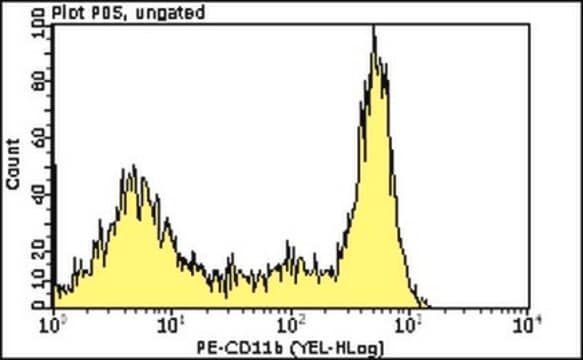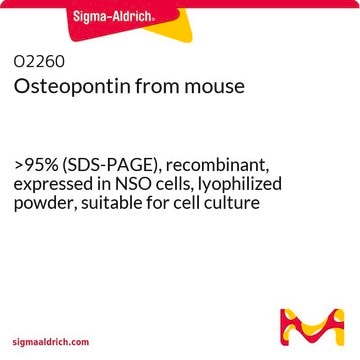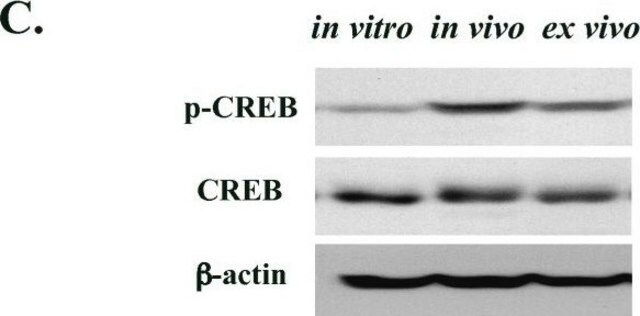499260
Osteopontin, His•Tag®, Mouse, Recombinant, Mouse
Synonyme(s) :
rmOPN
Se connecterpour consulter vos tarifs contractuels et ceux de votre entreprise/organisme
About This Item
Code UNSPSC :
12352202
Nomenclature NACRES :
NA.45
Produits recommandés
Pureté
≥95% (SDS-PAGE)
Niveau de qualité
Forme
lyophilized
Fabricant/nom de marque
Calbiochem®
Conditions de stockage
OK to freeze
Impuretés
≤100 pg/μg Endotoxins (pg/μg rmOPN)
Conditions d'expédition
ambient
Température de stockage
−70°C
Description générale
M.W. 65,000 and 30,000 under reducing conditions.
Recombinant, mouse osteopontin fused at the C-terminus to a His•Tag sequence and expressed in NSO-derived Leu17-Asn294 (Glu99Gly) murine myeloma cells. A secreted, highly acidic, Ca2+-binding, RGD-containing, phosphorylated glycoprotein. Chemotactic for macrophages, smooth muscle cells, endothelial cells, and glial cells. Has been shown to inhibit nitric oxide production and cytotoxicity by activated macrophages. Plays a significant role in inducing granulomas of various origin. OPN is also involved in the migration of embryonic fibroblasts, macrophages, and metastatic cells.
Recombinant, mouse osteopontin fused at the C-terminus to a His•Tag sequence and expressed in NSO-derived Leu17-Asn294 (Glu99Gly) murine myeloma cells. A secreted, highly acidic, calcium-binding, RGD-containing, phosphorylated glycoprotein. Osteopontin is expressed in several cell types including macrophages, fibroblasts, epithelial cells, T cells and osteoclasts in response to activation by cytokines, growth factors or inflammatory mediators. Mouse OPN cDNA encodes a 294 amino acid protein that has a 16 amino acid predicted signal peptide, which is cleaved to generate 278 amino acid mature protein. The mature protein contains an integrin binding arginine-glycine-aspartic acid (RGD) sequence. Exhibits some renoprotective actions in renal injury, such as increasing tolerance to acute ischemia, inhibiting inducible nitric oxide synthase, and reducing cell peroxide levels.
Actions biochimiques/physiologiques
~200 ng immobilized osteopontin/well will mediate the adhesion of ≥25% of the 293 cells plated at 10⁵ cells/well
Avertissement
Toxicity: Standard Handling (A)
Forme physique
Lyophilized from 0.2 µm sterile-filtered PBS, 50 µg BSA/µg rmOPN.
Reconstitution
Following reconstitution, aliquot and freeze (-70°C). Stock solutions are stable for up to 1 month at 4°C and for up to 3 months at -70°C. Avoid freeze/thaw cycles of stock solutions.
Reconstitute to ≥100 µg/ml with sterile PBS.
Autres remarques
Xie, Y., et al. 2001. Kidney Int.60, 1645.
Chiba, S., et al. 2000. Microbiol. Immunol. 44, 319.
Miyazaki, Y., et al. 1990. J. Biol. Chem. 265, 14432.
Chiba, S., et al. 2000. Microbiol. Immunol. 44, 319.
Miyazaki, Y., et al. 1990. J. Biol. Chem. 265, 14432.
Informations légales
CALBIOCHEM is a registered trademark of Merck KGaA, Darmstadt, Germany
HIS TAG is a registered trademark of Merck KGaA, Darmstadt, Germany
Code de la classe de stockage
11 - Combustible Solids
Classe de danger pour l'eau (WGK)
WGK 1
Point d'éclair (°F)
Not applicable
Point d'éclair (°C)
Not applicable
Certificats d'analyse (COA)
Recherchez un Certificats d'analyse (COA) en saisissant le numéro de lot du produit. Les numéros de lot figurent sur l'étiquette du produit après les mots "Lot" ou "Batch".
Déjà en possession de ce produit ?
Retrouvez la documentation relative aux produits que vous avez récemment achetés dans la Bibliothèque de documents.
Kristen Johnson et al.
Journal of bone and mineral research : the official journal of the American Society for Bone and Mineral Research, 18(6), 994-1004 (2003-06-24)
Osteopontin and PP(i) both suppress hydroxyapatite deposition. Extracellular PP(i) deficiency causes spontaneous hypercalcification, yet unchallenged osteopontin knockout mice have only subtle mineralization abnormalities. We report that extracellular PP(i) deficiency promotes osteopontin deficiency and correction of osteopontin deficiency prevents hypercalcification, suggesting
Notre équipe de scientifiques dispose d'une expérience dans tous les secteurs de la recherche, notamment en sciences de la vie, science des matériaux, synthèse chimique, chromatographie, analyse et dans de nombreux autres domaines..
Contacter notre Service technique








